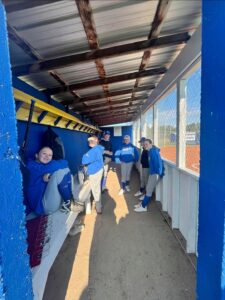
During a recent Whitecourt Town Council meeting, the topic of railway advocacy was brought forward. A Request For Decision (RFD) prepared for Council stated that there had been an increasing number of times when the rail system has “failed to meet service obligations,” which undermines the competitiveness of local industry that relies on it. Canadian Pacific and Canadian National own and operate railway lines across the province and Canada, a duopoly.
Community leaders and industry representatives have been discussing ways to move toward finding a solution. Led by the Mayor of Grande Prairie, Jacki Clayton, the Community Railway Advocacy Group, which includes Whitecourt Mayor Tom Pickard, is ready to execute a lobbying strategy for both the provincial and federal governments.
“It’s a group that has a number of mayors that have been affected by the effects of decreased rail cars for moving product, and of course, that’s what moves a majority of our product out of our area,” explained Town CAO Peter Smyl. “The group has been working actively for approximately 6-10 weeks and has the opportunity to meet some federal ministers that can do the change. The industry has stepped up and come on board with financial support and is looking for some kind of buy-in from communities.”
Municipalities are being asked to throw $2000 into the hat to help pay for the lobbying company, Canadian Strategy Group (CSG). In a letter dated November 12, Alberta Forest Products Association (AFPA) Senior Vice-President Brock Mulligan explained the cost. “We are seeking both advocacy and financial support from our municipal partners to execute the strategy and stand up for our communities and industries. The budget from CSG to execute the strategy is $35,000 over four months. AFPA is prepared to contribute $15,000 of this budget,” which leaves $20,000 to raise through community partners. “We anticipate the cost for municipal partners to join this initiative would be $2,000 – $4,000 depending on how many are able to commit resources,” wrote Mulligan.
Mayor Tom Pickard said that the interest in the group exploded, leading to a lower cost. “I spoke to Brock Mulligan last week. The two thousand is likely going to be more than they will need from us. They were looking for five communities, and at that point, it would have been $4000 each to make up the $20,000 that we require. Now it appears numerous communities are actively seeking to participate, and that number is likely to drop, even from the $2000. If we send $2000 and it turns out they didn’t need it, they will refund each community, so we are each paying the same share of that cost,” explained Mayor Pickard.
The rail line accessibility for industry has changed significantly over the last few years. “It’s the combination of a war in Ukraine, a program by Canadian farmers to feed the world and the realization that to do so requires more rail cars,” said Mayor Pickard, adding that getting more rail cars has proven increasingly difficult.
“There’s also the Alberta Forest Products Association working on behalf of their group that is looking to rebuild the world. There have been several disasters throughout North America and other places in the world, and there is a significant demand for Canadian wood and fibre products.” Mayor Pickard said that accessing the rail system to get products to market has been troublesome for the forestry industry.
“Last fall and during the summer, we had shifts cancelled at major mills in the area because they were not able to get product to market, and it has attributed to issues with sufficient rail capacity. As winter approaches, the trains get shorter, contributing to a reduced number of cars,” explained Mayor Pickard.
Asked what the quick fix is for the issue, Mayor Pickard said it has to do with getting fair and adequate service. “Railways in Canada are Canadian in name only, as they are primarily American-owned. The concern is they appear to be more focused on shareholders than towards Canadians. They have a duopoly, and it’s a regulated duopoly with responsibility.”
He said that though the lobby is not intended to be loud, it is expected to remind rail companies of their responsibilities as duopolies in the country, the biggest being offering fair and adequate service across the board. “Fair and adequate service does not mean you bid out rail cars and does not mean that you only ship out rail cars to the big centres where there is more return on investment. Fair and equitable service means everyone gets rail cars. That’s the lobby’s initiative.”
Fear of retaliation is one reason an individual company might not want to stand up to a duopoly. The group, complete with industry representatives and municipal leaders, is a better way forward. “That’s why industry, the Alberta Forest Products Association and other industry players have sought the help of the municipalities in this area, particularly Grande Prairie, Slave Lake, Hinton, Edson and Whitecourt, because of our mills and the resources that we send to the world,” explained Mayor Pickard.
In his letter, Mulligan stated that money needs to be invested back into the system. “While Canada’s railway duopoly continues to make record profits, they are failing to invest those profits back into the people and infrastructure to fulfill their service obligations.” He stated that negative impacts are affecting rural Alberta in a big way and that unreliable service “undermines competitiveness” while tarnishing industry reputation as a reliable supplier, which harms jobs. Further updates will come forward as the lobbying strategy gets underway.







More Stories
Community spirit shines at large-scale youth baseball event
Birthday party chaos sung beautifully by Pumpjack Players’ youth in spring musical
Gearing up for another season of cars, cruising and camaraderie